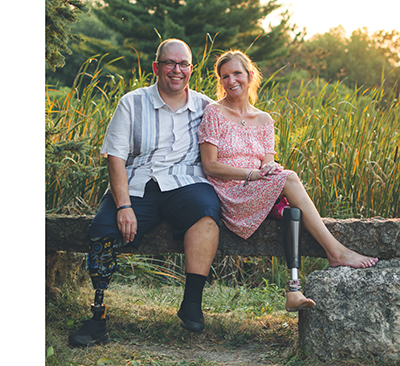When Kim Mylinski first crossed paths with Tom Carlson at the 2019 Amputee Coalition National Conference, sparks didn’t exactly fly.
“I heard him talking. I was like, ‘Well, this guy is full of BS,’” she laughs. “Later on I got a glimpse of who he was. He kind of followed me around the conference. He would park himself in a spot where he could see me come off the elevators and say hi. That’s how it started.”
The happy ending arrives this July, when Mylinski and Carlson tie the knot in Joliet, Illinois, and become members of an exclusive club: husband-and-wife Certified Peer Visitors (CPVs).
That’s what brought Carlson and Mylinski to the 2019 national conference in the first place: They’d both registered for CPV training. Their bond grew out of a shared desire to help new amputees adjust to limb loss, a process each had struggled with.

Photo by Marquis Erickson Photography
“In the beginning [of limb loss], you don’t know who you are. It took a while to evolve back into myself and realize that I don’t have to be ashamed of myself or feel guilty about getting my needs met.”
—Kim Mylinski
“I had a hard time at first,” says Carlson, a below-knee amputee since 2016, “because there were no support groups or other resources in the area where I lived [in eastern Tennessee].” Mylinski, who lost her left leg above the knee in 2015, adds: “I didn’t have any peer visitor to talk to. There was nobody to plug me in to get the kind of help that should be readily available.”
They left the conference as good friends, and their relationship deepened in the ensuing months as Carlson got active as a CPV and launched an amputee support group.
“Tom would call me and say, ‘What do you think about this or that situation?’” says Mylinski, a former nurse with a health professional’s grasp of how to solve problems. “It was awesome to watch him evolve after the conference, and he just grew on me.”
The other thing that grew was Mylinski’s self-confidence. Limb loss and other health issues contributed to the breakup of her first marriage, and she struggled to reclaim her identity afterward. “In the beginning [of limb loss], you don’t know who you are,” she says. “It took a while to evolve back into myself and realize that I don’t have to be ashamed of myself or feel guilty about getting my needs met.”
Carlson took his own lumps on the dating circuit after his amputation, but he’s an optimist by nature. “I see what a lot of amputees go through,” he says. “And I just try to tell them, there will be love out there for you. It might take some time, but you’ll find that person who loves you for who you are.”
The couple hasn’t teamed up on any peer visits yet, but they’re using their CPV training in their relationship. “We both understand the psychosocial and emotional issues that come with being an amputee,” Mylinski says. “So we can provide that support to each other.”



